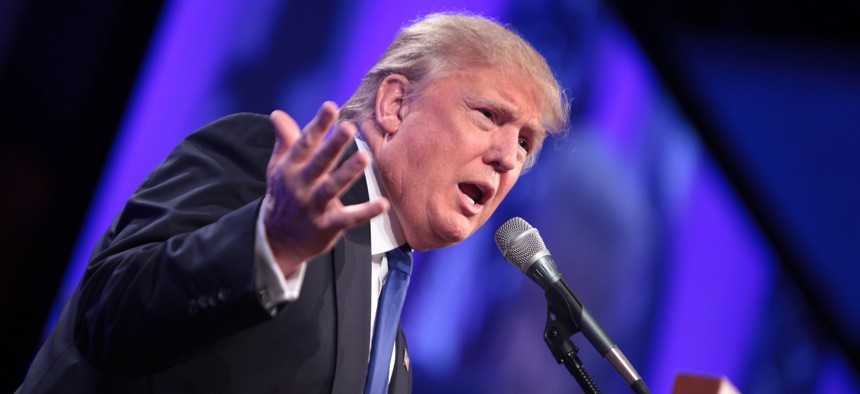
Flickr user Gage Skidmore
Trump and Sanders Are Doing Well Because They Tap Into the Same Anxious Feelings
They both foment outrage at trade policies that have hurt America’s middle class.
Last summer, as America fawned over Donald Trump and Bernie Sanders, the media dismissed them as unelectable—reasonable-seeming bets given Sanders’s socialism and Trump’s chronic offense-giving. But after both took second place in the Iowa caucuses, Sanders and Trump are now on track to win the New Hampshire primaries for their respective parties (or so say the polls). The men have something else in common too: outrage at trade policies that have hurt America’s middle class.
Of course, populist upstarts like Ross Perot and Ralph Nader have flared up in past elections—but they ran as third-party candidates. Sanders and Trump are seriously challenging their parties’ mainstream contenders. It’s an imperfect measure, but if you combine their vote shares in the Iowa caucuses and in the average of the New Hampshire polls, the Sanders-Trump populist bloc beats out the aggregate share of establishment candidates (namely, Hillary Clinton, Marco Rubio, John Kasich, Chris Christie, and Jeb Bush) and conservaties (Ted Cruz and Ben Carson).
It’s probably no coincidence that both campaigns are resonating with voters in a way they haven’t in the recent past. Over the course of the last decade or so, changes in the US economy have crept from hurting primarily working-class households to undermining middle-class households too, says John Russo, visiting scholar at the Kalmanovitz Initiative for Labor and Working Poor at Georgetown University.
The share of the US families occupying America’s middle class (meaning, three-person households earning $42,000-126,000, in 2014 dollars) has withered rapidly, according Pew Research Center. In absolute terms, more people have slid into society’s poorest class than have graduated to the upper-class tier.
There’s now a “critical mass” of households suffering economic insecurity that now includes both income groups, Russo told Quartz.
“The way it’s talked about [by both candidates] is not terribly dissimilar. Sanders has a lot to say about trade; you hear the same thing coming from Trump,” he says. “There’s a similarity in terms of two types of populism that are out there now and I think it stems from the politics of resentment and the decline in the American dream.”
Russo isn’t the only one to notice that shared emphasis on “fair trade.” A few days ago, Trump told CNN that he and Sanders “very much agree” on trade. Both men argue that the US’s knee-jerk promotion of free trade and corporate investment overseas has shifted decently paying jobs abroad.
And those are hardly the only eerie commonalities. Both want to offeruniversal healthcare, expand social security, and increase infrastructure investment. They reject receiving corporate campaign donations and openly scorn the media.
Of course, there are also gaping differences in how Trump and Sanders address growing middle-class resentment. For example, Trump’s bête noire is immigrants who are (supposedly) taking American jobs. Sanders, meanwhile, whips up outrage at the banks for squandering wealth and at the rich for not paying enough taxes. But the fieriness of rhetoric? Plenty similar.
(Image via Flickr user Gage Skidmore)
NEXT STORY: Win or Lose, Ryan Will Bear Budget Burden






